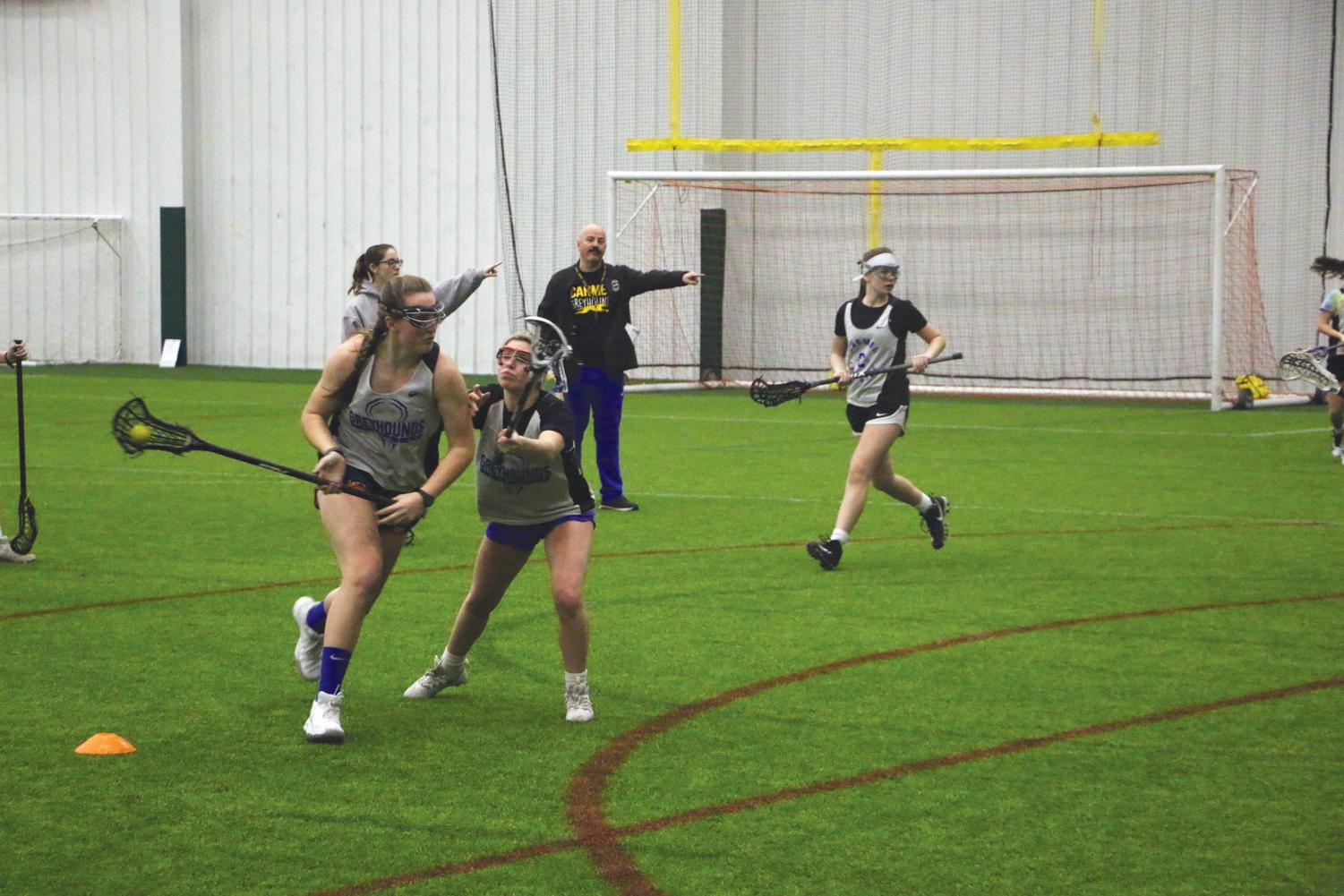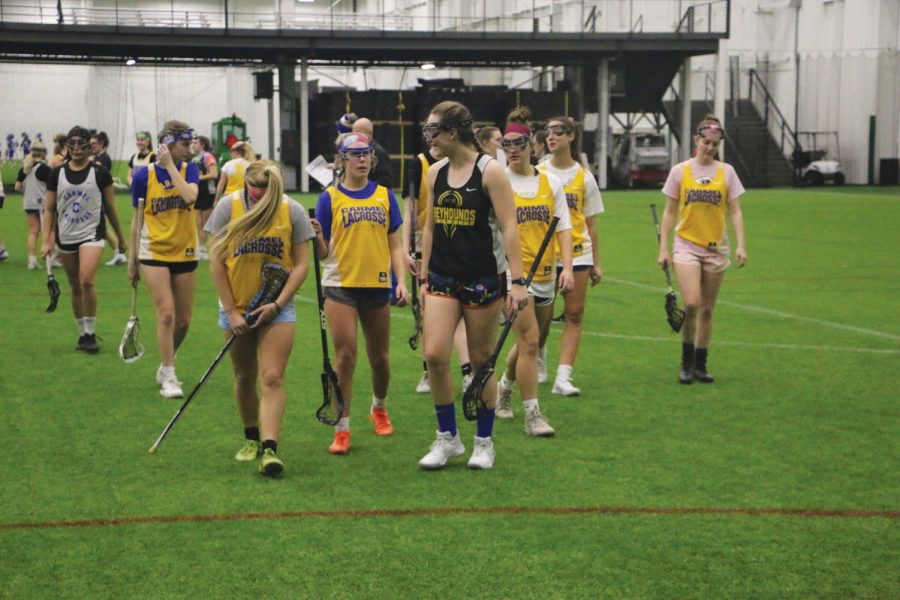With two hours of lacrosse practice after school and up to three games throughout the week combined with a rigorous academic course load, Caroline Ramsey, lacrosse player and senior, said she feels overworked 100% of the time.
“(You know you’ve reached your limit when) your body starts to break down. You start getting injured; little things will just make you exhausted,” she said. “I probably get to that point too often. I tend to work myself right up to that edge all the time, and it’s not exactly healthy.”
Even off-season, Ramsey said she trains around two and one-half hours a day, working on speed, agility, conditioning and weight training.

MAKING MOVES:
Lacrosse Head Coach Brandon Burke gives orders to senior Caroline Ramsey as she navigates her way through her teammate during practice on Saturday morning. “You get to a point where you’re having to do so many things that you get so exhausted that making decisions is hard,” Ramsey said.
According to new research, this could affect her off the field. In a recent study of triathletes published in the Current Biology journal, researchers evaluated overtraining syndrome, a form of burnout defined as an unexplained performance drop associated with intense fatigue.
In the study, athletes increased their weekly training by 40%. After three weeks, they were more likely than the control group to choose immediate gratification over long-term rewards. Brain scans of these athletes also revealed decreased activity in the prefrontal cortex, an area of the brain responsible for decision-making.
“You get to a point where you’re having to do so many things that you get so exhausted that making decisions is hard,” Ramsey said. “You will take the easiest way out just to get it over with, just because you’re too tired to think about the consequences, too tired to think about how you’re going to struggle to the long term.”
Swimmer and sophomore Lizzie Maurer said she has had a similar experience. Her practice schedule consists of eight practices each week—a combination of before and after school—for a total of about 16 hours.
“When I have a lot of tests the next day, I don’t really like going to practice because I have no motivation to study at home after I’m super tired,” Maurer said. “I normally stay up until 1:30 a.m. every day and then wake up at 4:30 a.m.”
However, Maurer said her coaches do modify practice to give athletes a break after a rough week of practice, although she said, “not often.”
According to head swimming coach Chris Plumb, swimmers are allowed three unexcused absences throughout the year along with any excused absences for commitments such as college visits and doctors appointments.
“We are a varsity sport at Carmel High School, so I feel, to be on the team, it requires (the) level of commitment in a varsity sport,” Plumb said. “(We) try to make sure that there’s a balance between commitment to the program and being on a team, and that means showing up and making sure you have a balanced lifestyle, doing your schoolwork and those things.”
But Ramsey said this balance can be hard to achieve. A quick Google search of “academics, athletics and social life” garners hundreds of thousands of hits, but none of them are able to provide a direct solution.
Still, Maurer and Ramsey said their coaches are aware of their physical limitations and may provide recovery days.
“Rest and relaxation time gets pushed to the wayside until the end of season, (but) coaches do realize that you’re human and that you have your limits,” Ramsey said. “Sometimes they also get blinded by the winning aspect of it, and they don’t always see it, but in general, they’re very receptive of seeing when we’re struggling and having a bad day.”

In the end, Ramsey and Maurer said their love for their sports helps them overcome the time commitment and fatigue. This aligns with research surrounding student-athlete happiness. In a study of student-athletes in Division 1 schools, researchers found that although athletes regret that their participation in sports led them to miss out on some aspects of college, it instilled unique values and enhanced their overall college experience.
“For a long time, sports was just something that I did because my parents forced me to,” Ramsey said. “I finally settled on lacrosse because of the atmosphere of camaraderie and teamwork that it fosters because it is a sport that you can’t win by yourself. Having those good relationships with teammates (and) feeling supported by them is really important. Also, I love a good competition. (Lacrosse) gave me a great outlet that I hadn’t found anywhere else in my life.”































![What happened to theater etiquette? [opinion]](https://hilite.org/wp-content/uploads/2025/04/Entertainment-Perspective-Cover-1200x471.jpg)














































![Review: “The Immortal Soul Salvage Yard:” A criminally underrated poetry collection [MUSE]](https://hilite.org/wp-content/uploads/2025/03/71cju6TvqmL._AC_UF10001000_QL80_.jpg)
![Review: "Dog Man" is Unapologetically Chaotic [MUSE]](https://hilite.org/wp-content/uploads/2025/03/dogman-1200x700.jpg)
![Review: "Ne Zha 2": The WeChat family reunion I didn’t know I needed [MUSE]](https://hilite.org/wp-content/uploads/2025/03/unnamed-4.png)
![Review in Print: Maripaz Villar brings a delightfully unique style to the world of WEBTOON [MUSE]](https://hilite.org/wp-content/uploads/2023/12/maripazcover-1200x960.jpg)
![Review: “The Sword of Kaigen” is a masterpiece [MUSE]](https://hilite.org/wp-content/uploads/2023/11/Screenshot-2023-11-26-201051.png)
![Review: Gateron Oil Kings, great linear switches, okay price [MUSE]](https://hilite.org/wp-content/uploads/2023/11/Screenshot-2023-11-26-200553.png)
![Review: “A Haunting in Venice” is a significant improvement from other Agatha Christie adaptations [MUSE]](https://hilite.org/wp-content/uploads/2023/11/e7ee2938a6d422669771bce6d8088521.jpg)
![Review: A Thanksgiving story from elementary school, still just as interesting [MUSE]](https://hilite.org/wp-content/uploads/2023/11/Screenshot-2023-11-26-195514-987x1200.png)
![Review: "When I Fly Towards You", cute, uplifting youth drama [MUSE]](https://hilite.org/wp-content/uploads/2023/09/When-I-Fly-Towards-You-Chinese-drama.png)
![Postcards from Muse: Hawaii Travel Diary [MUSE]](https://hilite.org/wp-content/uploads/2023/09/My-project-1-1200x1200.jpg)
![Review: "Ladybug & Cat Noir: The Movie," departure from original show [MUSE]](https://hilite.org/wp-content/uploads/2023/09/Ladybug__Cat_Noir_-_The_Movie_poster.jpg)
![Review in Print: "Hidden Love" is the cute, uplifting drama everyone needs [MUSE]](https://hilite.org/wp-content/uploads/2023/09/hiddenlovecover-e1693597208225-1030x1200.png)
![Review in Print: "Heartstopper" is the heartwarming queer romance we all need [MUSE]](https://hilite.org/wp-content/uploads/2023/08/museheartstoppercover-1200x654.png)



